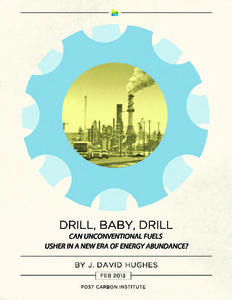Drill, baby, drill: can unconventional fuels usher in a new era of energy abundance?
"It’s now assumed that recent advances in fossil fuel production – particularly for shale gas and shale oil – herald a new age of energy abundance, even “energy independence,” for the United States. Nevertheless, the most thorough public analysis to date of the production history and the econom...
| Main Authors: | , |
|---|---|
| Institution: | ETUI-European Trade Union Institute |
| Format: | TEXT |
| Language: | English |
| Published: |
Santa Rosa
2013
PCI |
| Subjects: | |
| Online Access: | https://www.labourline.org/KENTIKA-19128092124919462749-Drill,-baby,-drill-can-unconve.htm |
| Summary: | "It’s now assumed that recent advances in fossil fuel production – particularly for shale gas and shale oil – herald a new age of energy abundance, even “energy independence,” for the United States. Nevertheless, the most thorough public analysis to date of the production history and the economic, environmental, and geological constraints of these resources in North America shows that they will inevitably fall short of such expectations, for two main reasons: First, shale gas and shale oil wells have proven to deplete quickly, the best fields have already been tapped, and no major new field discoveries are expected; thus with average per-well productivity declining and ever-more wells (and fields) required simply to maintain production, an “exploration treadmill” limits the long-term potential of shale resources. Second, although tar sands, deepwater oil, oil shales, coalbed methane, and other non-conventional fossil fuel resources exist in vast deposits, their exploitation continues to require such enormous expenditures of resources and logistical effort that rapid scaling up of production to market-transforming levels is all but impossible; the big “tanks” of these resources are inherently constrained by small “taps.”" |
|---|---|
| Physical Description: | 166 p. Digital |

